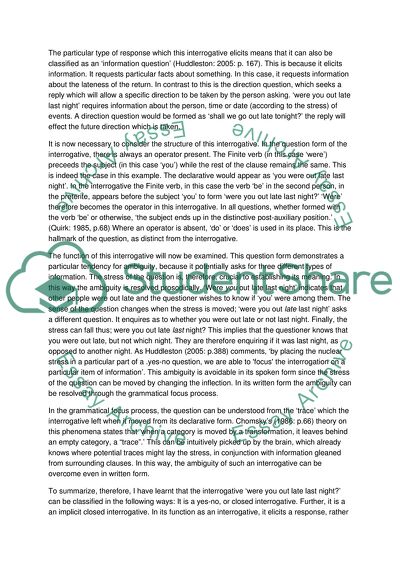
- Home
- Free Samples
- Premium Essays
- Editing Services
- Extra Tools
- Essay Writing Help
- About Us
- Studentshare
- Subjects
- Miscellaneous
- Grammar and Lexis 2 - Interrogative
Grammar and Lexis 2 - Interrogative - Essay Example

- Subject: Miscellaneous
- Type: Essay
- Level: Undergraduate
- Pages: 4 (1000 words)
- Downloads: 0
- Author: schimmelsydney
Extract of sample "Grammar and Lexis 2 - Interrogative"
Haspelmath (2001: p.1010) identifies three essential types of interrogative with three uses; ‘(i) to ask whether a proposition or its negation is true, (ii) to enquire which values (if any) instantiate the variables of an open proposition and (iii) to query which element of an a set of alternatives makes an open sentence true’. The interrogative ‘were you out late last night?’ falls into the first category. The second would consist of a question such as ‘what time did you get home last night’, and the third a question such as ‘Did you stay out late or come home early last night?
’ Haspelmath (2001: p.1011) defines these types of interrogatives as ‘polar interrogatives’, constituent interrogatives’ and ‘alternatives interrogatives’ respectively. The interrogative which this essay deals with is, therefore, a polar interrogative. These polar interrogatives are also known as ‘yes-no’ interrogatives. This is because they elicit a response which is either positive or negative, but do not elicit further information. As Quirk (1985: p.52) explains, they ‘seek a yes or no response in relation to the validity of (normally) an entire predication’.
This is indeed that case here, since the predicate is complete. The respondent will either confirm that ‘yes’ they were out late last night, or ‘no’ they were not. This is the only information which the interrogative requires. This is also known as a ‘closed’ interrogative, since it does not elicit a variety of answers. Closed interrogatives, furthermore, fall into two categories; implicit and explicit. As Huddleston (1988: p.136) outlines, ‘the expression of an explicit closed question includes an or co-ordination’.
This is therefore an implicit closed interrogative. An explicit closed question would be formed thus; ‘were you out late or did you come home early?’ It is explicit because the two
...Download file to see next pages Read MoreCHECK THESE SAMPLES OF Grammar and Lexis 2 - Interrogative
The Uses of Adjectives in Grammar Materials
An investigation into interrogative suggestibility
Universal Grammar in Second Language Acquisition
The Process of Second Language Acquisition
Grammatical Development in L2 Learners
Anyone Lived in a Pretty How Town by Edward Estlin Cummings
Formal Education and Training Provide only a Small Part of What is Learnt at Work
The Process of Linguistic Development of the Second Language

- TERMS & CONDITIONS
- PRIVACY POLICY
- COOKIES POLICY